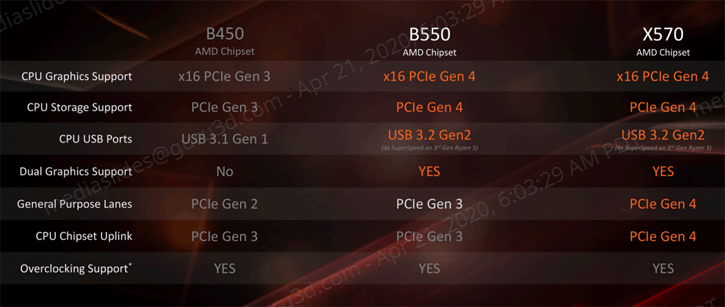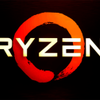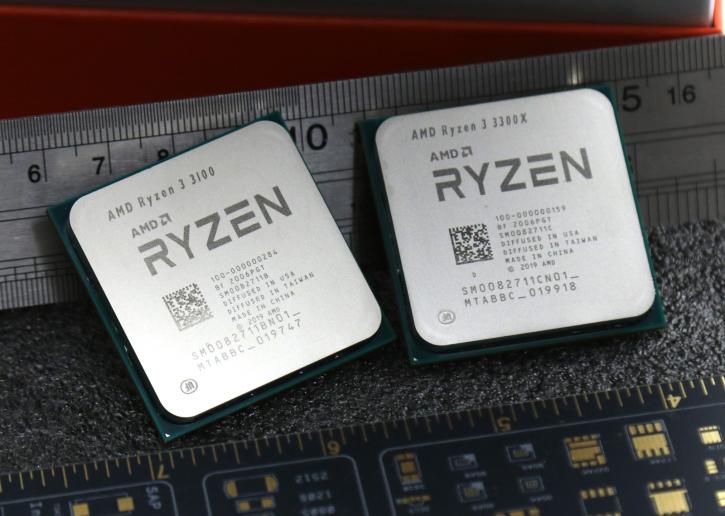PCI-Express 4.0 and the B550 chipset
Ryzen 3000 (Matisse) delivers 24 lanes PCIe 4.0
Ryzen 3000 CPUs have a total of 24 PCIe Gen4 lanes, yes, Gen 4.0. Four out of the twenty-four are used for the interconnect to the B550/X570 chipset, leaving 20 lanes Gen 4.0 for other utilization. 16 lanes (PCIe x16) are intended for graphics cards that are connected as x16 or two at x8. Compared to Gen 3.0, a Gen 4.0 x8 link would offer similar bandwidth to a PCIe 3.0 x16. Four more PCIe lanes from the CPU are designed for fast storage such as PCIe 4.0 NVMe compatible SSDs. In addition to all that, a sidenote - AMD has integrated USB 3.2 Gen2 support into the CPU, which means you get four 10 Gbps USB ports at SuperSpeed, there literally is a chipset chip inside the processor.
The B550 chipset
AMD also is launching its budget chipset. It'll become available at roughly June 2020 timeframe, but when we move to the B550 chipset, I would say it is very close in similarity towards X470. Meaning the chipset is PCIe Gen 3.0 including the uplink towards the processor. That also means the interlink between the chipset and CPU is running over four Gen 3 lanes. The good news is that with four extra Gen 4 lanes from the CPU, you can still opt to go with an M2 PCIe 4.0 slot, this goes as well for your video card. But let's compare a bit:
 |
||||||
| Chipset | End-user | USB 3.2 Gen 2 | USB 2.0 | SATA3 | Interconnect | OC Support |
| B550 | Mainstream | 2 | 6 | 4+4 | x4 Gen3 | Yes |
| X570 | Enthusiast | 8 | 4 | 4+8 | x4 Gen4 | Yes |
So compared to the top-end X570, it offers fewer USB 3.2 Gen2 (10 Gb/s) ports, the chipset basically does not support PCI Express 4.0, and communicates with the Ryzen processor via four PCI-E 3.0 lines (instead of PCI-E 4.0), which limits the total bandwidth controllers built into it.
| PCIe Version | Line Code | Transfer Rate | x1 Bandwidth | x4 | x8 | x16 |
|---|---|---|---|---|---|---|
| 1.0 | 8b/10b | 2.5 GT/s | 250 MB/s | 1 GB/s | 2 GB/s | 4 GB/s |
| 2.0 | 8b/10b | 5 GT/s | 500 MB/s | 2 GB/s | 4 GB/s | 8 GB/s |
| 3.0 | 128b/130b | 8 GT/s | 984.6 MB/s | 3.938 GB/s | 7.877 GB/s | 15.754 GB/s |
| 4.0 | 128b/130b | 16 GT/s | 1.969 GB/s | 7.877 GB/s | 15.754 GB/s | 31.508 GB/s |
So the main thing to remember, you can connect an NVMe M.2 SSD over PCIe Gen 4 as well as a graphics card as there PCIe Gen 4.0 is managed by the processor. The chipset itself is PCIe Gen 3.0 along with everything connected to it. Compared to B450 however, it's a significant update. PCE Gen 4 M2 SSDs are still pretty exclusive, however, as with everything in the world of technology, it'll evolve and become the new standard in the time to come. With B550 you'll at the very least be prepared for that.



